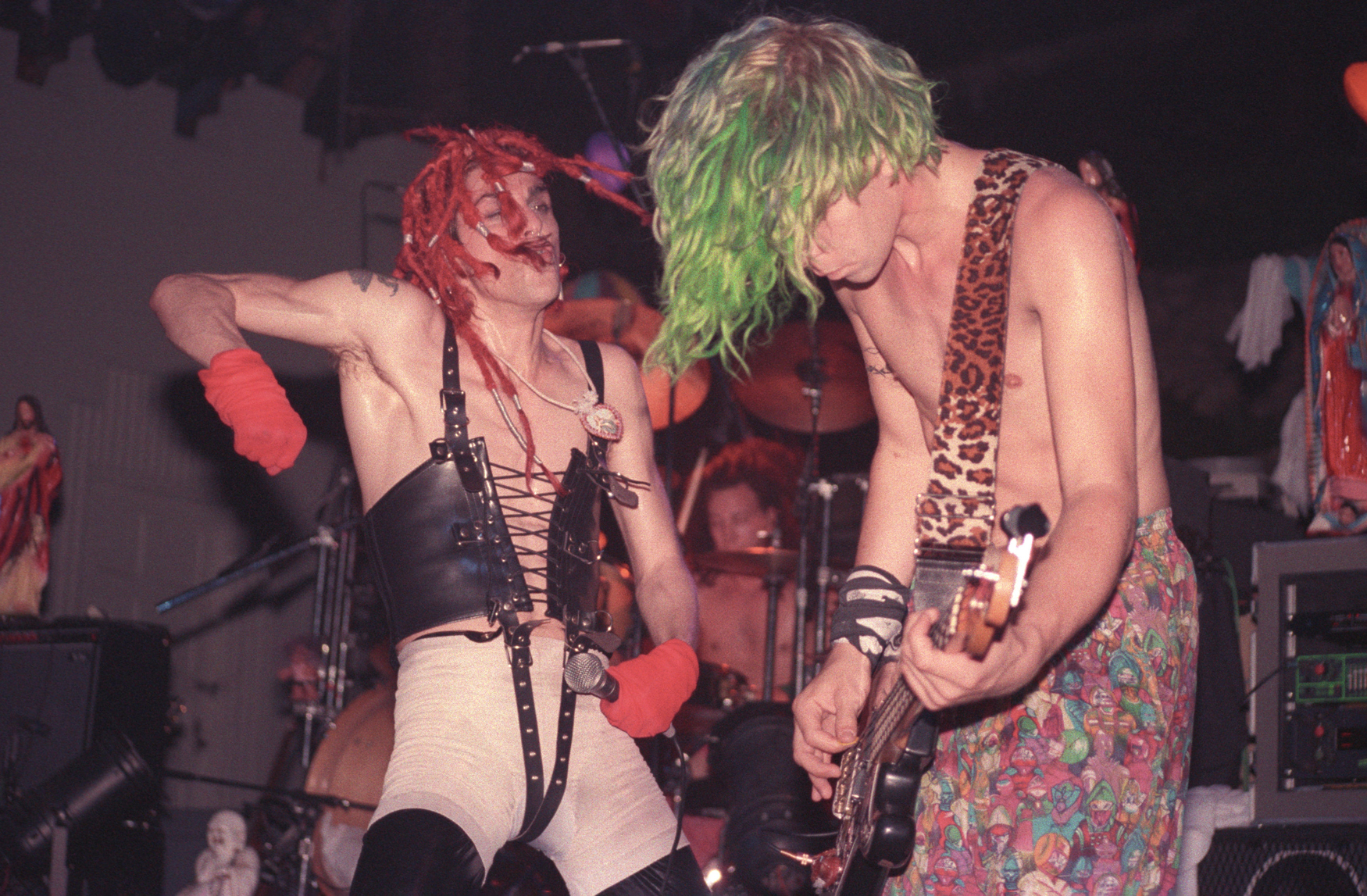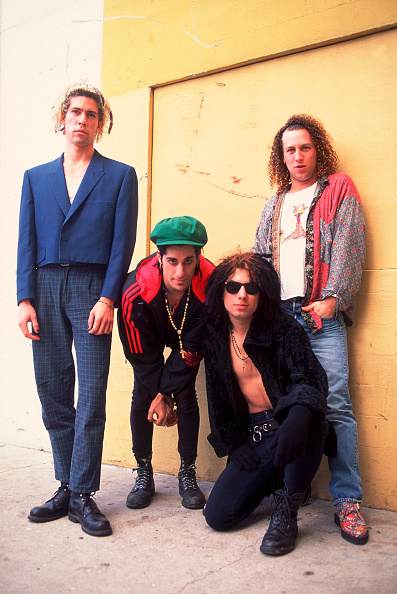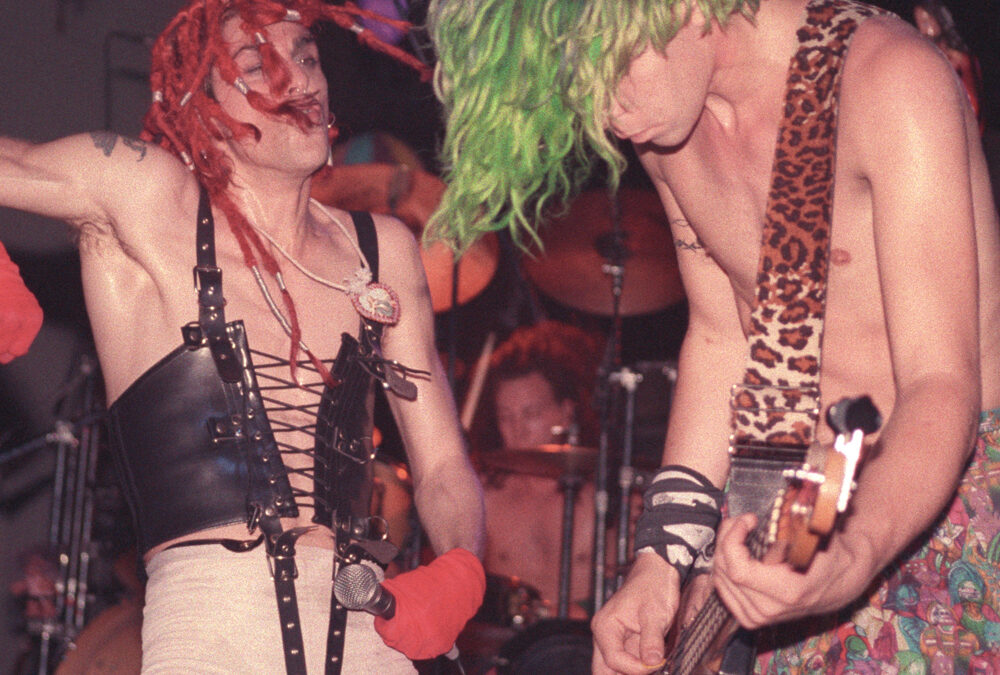Mojo
FEATURE
Jane’s Addiction O.D. with Ritual De Lo Habitual
They’d freaked out the squares with 1988’s Nothing’s Shocking, but Perry Farrell’s alt-rock diabolists went mainstream in 1990 with their epic, carnal second album and its nagging hit Been Caught Stealing. But divided into wrecked and sober factions, at their moment of triumph they went out on the Lollapalooza touring festival – and helped the alternative nation rise as they imploded.

Just Because: Jane’s Addiction’s vocalist, Perry Farrell, and bassist Eric Avery, performing at The John Anson Ford Theater in Hollywood, CA on April 25, 1989
Perry Farrell: “In 1976 I moved from Florida to Hemet, in the high Californian desert. I was 17, a runaway, a surfer. I had no intention of getting involved in music, I just fell into it. I lived in a house full of musicians – punk-rock, underground LA kids. They were dangerous, provocative. I was so drawn to their lifestyle. In the early 80s, I relocated to Silver Lake in Los Angeles, this underground art community. We were out every night, dealing with rock’n’roll, drugs… the wild way we dressed, how we wore our hearts on our sleeves, it wasn’t a joke or an act. My band, Jane’s Addiction, became the music of that time.”
Stephen Perkins: “We were a hybrid. We all had different record collections, wore different clothes. But we’d practice, hour after hour after hour, blending our influences. We were not built for the regular… I don’t think any of us could have done anything else.”
Dave Jerden: “They were creating a buzz in Hollywood, and those buzz bands are usually just record company bullshit. But they played real late one night at this old hotel in LA, and I got there at 3am, and there was a line of kids around the block. The greatest concert I ever saw was Jimi Hendrix at the Hollywood Bowl in 1968. That was mind-blowing. Jane’s Addiction that night… they were as good as that.”
Dave Navarro: “We had transvestite dancers and a motorcycle display. It was more of an art installation rather than a rock concert.”
PF: “I had a long-term plan. I always saw groups get raves for their first record, but get slammed by critics for their next one. So I held back our greatest songs when we recorded [1988 debut studio album Nothing’s Shocking] – stuff like Three Days and Then She Did. I knew we would prove ourselves with Nothing’s Shocking, and when we put out Ritual De Lo Habitual, with all our best songs, we’d prove it again. Any sports team can win the championship once – a truly great team repeats.”
SP: “We started Ritual, but after three weeks, we took a month off. Me and Dave Jerden had been at the studio every day, and no one else was turning up.”
DN: “We were in such poor condition (through drug use) that we had to stop and take a break. I couldn’t even tell you who was in bad shape, but I’m certain I was one of the culprits. My memory of making Ritual… lasts about five minutes.”
SP: “When we started up again, we were tight, urgent, ready-to-burst. We’d stay up all night, playing. Most of it was done live, and fast. We felt like we could do anything. Been Caught Stealing – the song that got us on MTV, our big crossover hit – is a fuckin’ swinging jazz tune, with a sense of humour.”
PF: “What I really loved were the more introspective, deeper tracks on side two, where I got to feel sad. The album is dedicated to Xiola Blue. I met her when she was 15, handing out flyers in front of the Roxy. She was this strange girl with blue dreadlocks, who’d drive up in her parents’ Cadillac from Orange County. I fell in love with her; we would do drugs together and go to clubs and listen to music at my house. We were together a year, and after she died [of a heroin overdose in New York, in June 1987], it got back to her family that I was singing about her, and they told me she was my cousin. I swear to you, I never knew we were related.”

Jane Says: (l-r) Eric Avery, Perry Farrell, Dave Navarro, and Stephen Perkins at the Palladium in Los Angeles, California, December 20, 1990
SP: “(Side two album track) Three Days is a total orgasm. It goes from soft, to hard, to cumming. [laughs]”
PF: “Three Days was inspired by Fela Kuti, how he told a story, and went through transitions. This story begins with a ménage à trois… Casey [Niccoli, Farrell’s long-term girlfriend], Xiola and I had been having sex and taking drugs, in our own universe of time and space, for three days. From there, I sing about man preying upon man, how technology is changing us, our weak, corrupt leaders… As a writer, I reflect on everything in my world. The trick is to have an exciting world.”
DJ: “The guys at Warner Bros came down to hear how the album was going the night they recorded Three Days. What you hear on the album was what the label had front-row seats for that night – they recorded it in one take. It was amazing. And then they picked up their instruments and went home.”
SP: “Ritual… was the highlight of the band, the peak of our friendship.”
DJ: “There was a lot of tension. Every Jane’s Addiction song had been written around an Eric Avery bass groove, but by Ritual, Eric was on his way out.”
PF: “There were cracks in the armour – disenchantment, unhappiness. I was not a sober man, and I didn’t want to be a sober man. I have to be honest, I don’t think being mind-altered from time to time is as bad as other people do. But other members of the band, their AA sponsors were telling them that I was the devil.”
Eric Avery: “I was clean, so I was kind of like, ‘What am I doing here?’ At the time we were doing Ritual, I was taking astronomy courses at Santa Monica College.”
SP: “We went on this massive world tour for a year to promote the album. And maybe we were all living in separate worlds at that moment, but we were so hungry to cross as many borders as we could, to experience new cities. There’s video of us playing Milan halfway through that tour, and we don’t look like we’re having much fun, but we sounded great. And afterwards, we went on to do the first Lollapalooza.”
PF: “I knew I was going to leave Jane’s, so Lollapalooza was like my last supper. I wanted a touring festival, inspired by the European festivals, this grand undertaking, with Jane’s headlining every night. I saw my mission as to mix together lifestyles, sounds and visions. I loved seeing different tribes together, all listening to the same group and dancing.”
Corey Glover: “Lollapalooza was just ridiculous – 26 shows in 40 days, all across America. Legends like Siouxsie & The Banshees, the madness of the Butthole Surfers, and Jane’s Addiction were incredible, every night. A complete circus. And whatever was going on backstage was happening onstage as well, the craziness was everywhere.”
“I was not a sober man, and I didn’t want to be a sober man.”
Perry Farrell
SP: “The bill also included Henry Rollins, Ice-T, Living Colour, Nine Inch Nails and Fishbone… I would show up at noon and hang out all day with the cats, and I didn’t play until 9pm. It was like being at camp, a family. It was great – the underground was going overground. LA already knew about it, but we took it to places like Kansas.”
Vernon Reid: “Before Lollapalooza, you’d see ear-rings, the occasional nose-ring; you did not have tongue-piercing! After that I started seeing bank tellers with pierced tongues. But stuff like The Jim Rose Circus [a travelling sideshow of pierced freaks and men who drank their own bile], *that never went mainstream.”
EA: “I was so fed up I decided to split. I told Dave first, because he was my best friend. And he went, ‘Oh, okay, cool. Me too.’”
SP: “We were going to split after Lollapalooza’s final date in Seattle, but we’d promised our manager Ted Gardiner we’d play some shows in Australia, where he was from. And then we hit Hawaii on the way home, and that was the final show. I’d just finished a record with [funk-metal supergroup] Infectious Grooves, and Rob Trujillo and Mike Muir showed up in Hawaii and said, ‘You’re breaking up tonight, but we’re opening for Ozzy for two months.’ I was in a new band that day, and I didn’t feel the sting as hard as maybe I could have.”
PF: “That day in Hawaii, I surfed, I got wasted, I balled, I performed like a madman. I gave everything, I left it all out on that stage. The next day I couldn’t get myself together to get on an airplane. When I finally got back to LA, I had no idea what I was going do next. I’d built a really great group, and now I’d busted it up. And I felt relieved, I’m sad to say. We were under pressure, we weren’t getting along… I didn’t want to deal with that.”
SP: “The end was brutal… we were like, ‘Fuck it, let’s break up’. We’d just headlined Lollapalooza, Ritual was fuckin’ massive, we’re not having a good time with each other – what’s the solution? But when we broke up, we felt like heroes. I mean, I wanted to make ten records with those guys, I was loving it. But I didn’t want to force it. Some flowers last for two or three days, and they’re gone. [laughs] We were a delicate flower.”
PF: “When I listen to Ritual now, I feel like I did what I should have done as an artist – I dug down deep into my soul, and I made sure that my life was an exciting, compelling story to tell. And I found a team of musicians to perform it, to play it, to write it with me. It’s one of the great achievements of my life.”
SP: “Lollapalooza set the stage for the next cultural wave. But while Jane’s Addiction pushed that boat off the dock, we didn’t get on it. But we are still friends, and we can still play like motherfuckers. There’s still hope.”
This article originally appeared in issue 309 of MOJO
Eric Avery quotes from Whores: An Oral History Of Perry Farrell & Jane’s Addiction (Brendan Mullen, Da Capo, 2005). Dave Navarro quotes from Whores and Billboard.
Interviews: Stevie Chick Images: Getty

